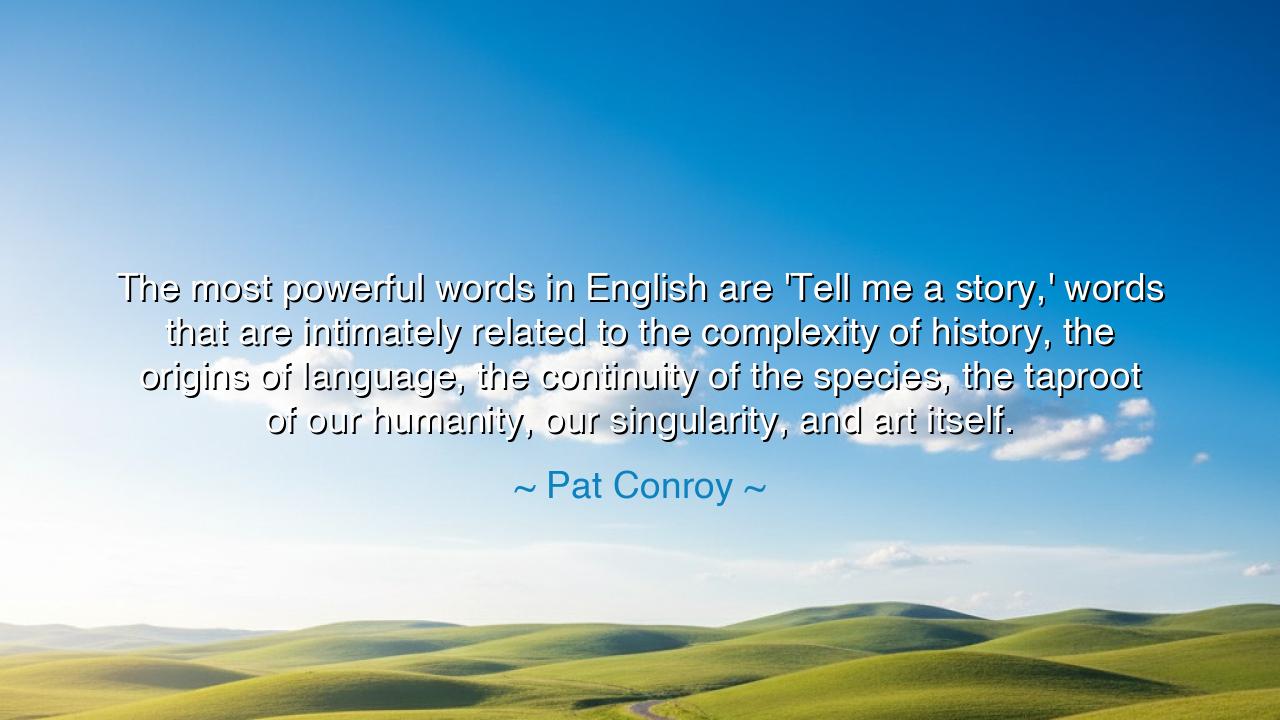
The most powerful words in English are 'Tell me a story,' words
The most powerful words in English are 'Tell me a story,' words that are intimately related to the complexity of history, the origins of language, the continuity of the species, the taproot of our humanity, our singularity, and art itself.






“The most powerful words in English are ‘Tell me a story,’ words that are intimately related to the complexity of history, the origins of language, the continuity of the species, the taproot of our humanity, our singularity, and art itself.” Thus spoke Pat Conroy, the great chronicler of the human heart, who understood that in the act of storytelling lies the essence of what makes us human. His words are not simply praise for the storyteller, but a recognition of an ancient truth — that the soul of civilization, the bridge between past and future, lives in the simple, sacred request: “Tell me a story.”
In those four words lies the origin of language, the spark of empathy, and the foundation of culture. Before there were books or temples, before men carved symbols into stone, there were voices by the fire, and stories told beneath the stars. Through story, humankind first gave shape to the invisible — to fear, love, hope, and death. The complexity of history began with memory spoken aloud, one generation teaching the next through the rhythm of voice. From those early tales of creation and struggle came not only entertainment, but survival. Storytelling became the first school, the first library, the first prayer.
Conroy, who wrote with both tenderness and tragedy, knew that to tell a story is to preserve the soul of a people. Empires rise and fall, monuments crumble, but a story, once told and remembered, cannot die. Think of Homer, who sang of heroes whose names might otherwise have vanished into dust. Think of Scheherazade, who told her stories not to boast or amuse, but to save her life — proving that story itself can conquer death. Or think of the enslaved men and women in America, who kept their dignity alive by whispering their histories in the dark, passing songs and legends from parent to child when every other freedom was denied. In each age, in each land, stories have been the vessels that carried truth when truth was forbidden.
The origins of language, Conroy tells us, are bound to this power. To speak is to name the world, to connect minds through sound, to weave meaning from chaos. Our ancestors did not invent words to describe the mundane alone — they invented them to share experience, to make sense of mystery, to say: “I have lived, and I want you to understand.” Thus, when one human turns to another and says, “Tell me a story,” they are not asking merely for amusement, but for communion. They are saying, “Show me the world through your eyes.” That act — that exchange of understanding — is what binds us together as a species. It is what has allowed us to endure.
And so, when Conroy calls these words the “taproot of our humanity,” he speaks of something primal and eternal. To ask for a story is to seek belonging; to tell one is to offer one’s heart. Every art that mankind has created — painting, dance, music, poetry — begins with the same impulse: to tell and to be heard. The cave paintings at Lascaux, the ancient epics carved in clay, the novels and films of today — all are forms of that same dialogue that began beside the first firelight. Through story, the dead speak to the living, the past shapes the present, and the present gives birth to the future.
Yet Conroy’s words also carry a challenge. In an age of noise and haste, we risk forgetting the quiet power of story. We consume fragments — headlines, posts, summaries — but seldom listen deeply. We have more voices than ever, yet fewer true connections. The plea “Tell me a story” requires patience; it requires humility; it demands that we listen not to reply, but to understand. If history is fractured, if empathy wanes, it is because we have forgotten how to sit at the fire and hear the human soul speak through words.
So, my child of the modern age, learn again to ask for stories. Seek them from the elders who carry the weight of years, from the strangers who walk different paths, from the voices history has tried to silence. And when your turn comes, tell your story — not for fame or pride, but to preserve the thread that binds you to the great human tapestry. For every tale, however small, adds color to the vast mural of our existence.
Remember always what Pat Conroy taught: that in every story told, humanity rediscovers itself. Stories are our memory, our conscience, our bridge to eternity. So when you hear those sacred words — “Tell me a story” — do not take them lightly. They are the oldest prayer of the human race, the whisper that has carried us through the ages. And as long as there is someone to tell and someone to listen, the flame of our shared humanity will never go out.






AAdministratorAdministrator
Welcome, honored guests. Please leave a comment, we will respond soon